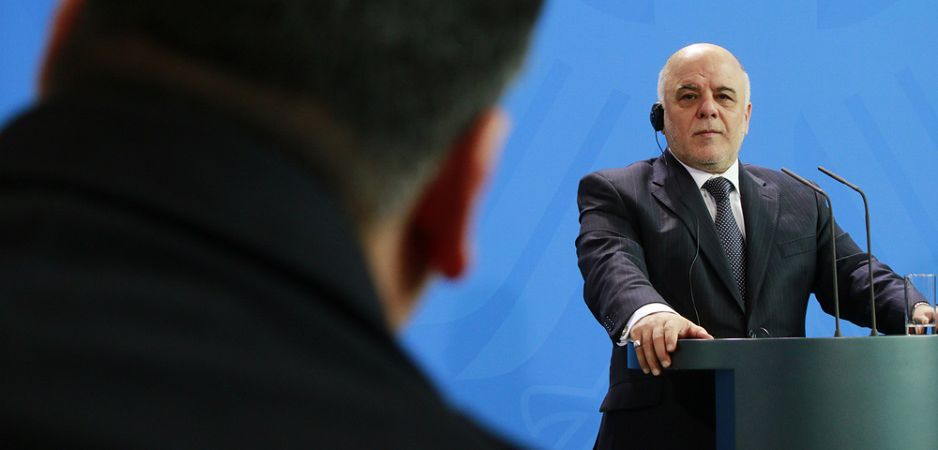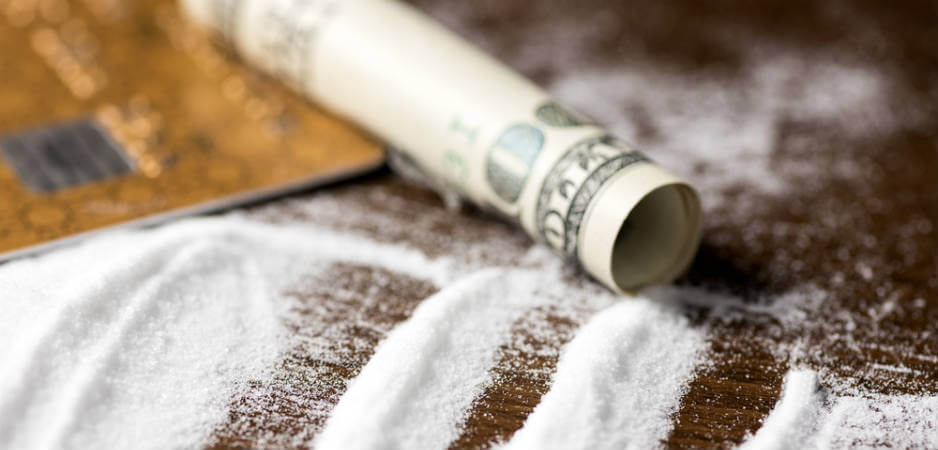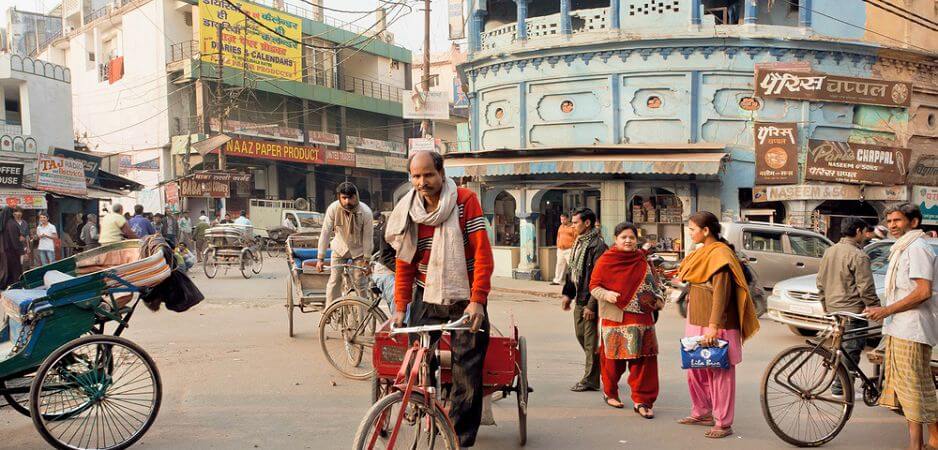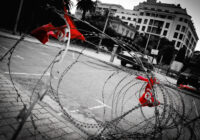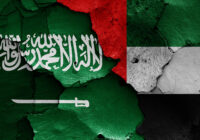Even as Iraq’s prime minister struts around Mosul, fresh troubles lie ahead unless reform, reconciliation and reconstruction succeed.
This week, the Trump family saga rolled on. After Ivanka, a true Americana princess, sat briefly on daddy’s throne at the G20 summit, it is her brother’s turn to occupy the spotlight. In his own words, Donald Trump Jr. “was asked to have a meeting by an acquaintance I knew from the 2013 Miss Universe pageant with an individual who I was told might have information helpful to the campaign.” He asked Jared Kushner, his brother-in-law now in-charge of everything from reforming American government to bringing world peace, to attend. He also asked Paul Manafort, his father’s campaign manager, to come to the meeting.
Trump Jr.’s acquaintance who set up the meeting in 2016 is Robert Goldstone, a Jewish publicist in London who represents Emin Agalarov, a Russian musician who is the son of an oligarch. Donald Trump, the current president of the US and former owner of the Miss Universe pageant, appears in an Agalarov music video and fires him for daydreaming about beauty queens. Apparently, this meeting was not about seductive damsels in swimsuits. The top guns in the Trump campaign met Natalia Veselnitskaya, a Russian lawyer who might have passed on compromising details about Hillary Clinton. There is that sneaking suspicion that she might have been connected to Russian intelligence. American news media have gone bananas over the latest episode in the saga of the Trumps that is turning out to be more riveting than the cult television series, House of Cards.
Even as the US experiences sound and fury signifying little, Latin America experienced a momentous seven days. In his third and final amnesty decree, Colombian President Juan Manuel Santos granted amnesty to rebels belonging to Fuerzas Armadas Revolucionarias de Colombia (the Revolutionary Armed Forces of Colombia), or FARC.
It has been a road of twists of turns. The September 4, 2016, edition of The World This Week analyzed how a ceasefire between the government and the rebels ended 52 years of civil war. Yet the peace deal that led to the ceasefire was rejected by a wafer thin majority of 50.2% in a referendum that led this author to muse if referendums were the best way to achieve peace in divided societies in a later edition of The World This Week. Santos pushed through a revised version of the peace deal through congress, won the Nobel Prize for Peace, and pursued his policy to incorporate FARC into Colombia’s democratic process.
Just as Colombian democracy seems to be emerging out of conflict, Brazil’s democracy is descending into complete chaos. A judge found Luiz Inácio Lula da Silva, the charismatic former president, guilty of corruption and has sentenced him to almost 10 years in prison. A construction company gifted Lula an apartment worth 2.2 million reais ($690,000). In return, Lula influenced Petrobas, the state-run oil giant, to award contracts to this firm. Dilma Rousseff, Lula’s protégé, was impeached from the presidency. Her successor, Michel Temer, is also accused of corruption.
Operation Lava Jato (“Car Wash”) began as a routine money-laundering operation, but it has engulfed the highest levels of Brazil’s political elite. The May 15, 2016, edition of The World This Week predicted a bleak future for Brazil when Rousseff was impeached. Some argue that Lava Jato is the long overdue cleansing of Brazil’s political system. Others see it as a witch-hunt where “preventive detention” and plea bargaining have allowed a Jacobin judiciary to destroy Brazil’s political stability. They see these investigations as furthering a neoliberal right-wing agenda and facilitating the center-right Temer’s takeover from a democratically elected center-left government.
Glenn Greenwald, an astute observer of Brazil, is of this view. The Economist makes the argument that a better country will emerge after the investigations, but that is unlikely unless there is political and economic reform. Of that, there is little prospect.
For all the momentous developments in the Americas, it is the Middle East that is back in focus. Iraqi Prime Minister Haider al-Abadi declared victory over the Islamic State in Mosul.
WHY MOSUL MATTERS?
In 2014, the Islamic State seized Mosul in Iraq. Its fighters advanced rapidly from Syria. Instead of fighting, the Iraqi military melted away. The Islamic State’s takeover of the Sunni provinces of Nineveh and Anbar was blitzkrieg-like. With its size, nearby oilfields and surrounding fertile land, Mosul became the jewel in the Islamic State crown. The fall of Mosul made mockery of US claims that it had “strategically defeated” al-Qaeda and of Iraqi claims that it was a functioning state. It was here that Ibrahim Awwad Ibrahim al-Badri, otherwise known as Abu Bakr al-Baghdadi, proclaimed himself as a caliph and his realm a caliphate.
In the aftermath of Mosul, the Iraqi government led by Nouri al-Maliki dismissed the commander who lost Mosul, Lieutenant General Mahdi Sabeh al-Gharrawi. A special report by Reuters found that Maliki and his most senior officers shared at least some of the blame. A later parliamentary probe in Iraq implicated Maliki and 35 other officials. It turns out that “troop shortages and infighting among top officers and Iraqi political leaders played into Islamic State’s hands and fueled panic that led to the city’s abandonment.” Maliki and his defense minister also turned down repeated offers of help from the Peshmerga, the Kurdish fighters in northern Iraq.
Maliki was relying on a tiny Shia clique around him, and the fall of Mosul captured all that was wrong with post-2003 Iraq. Once the US got rid of Saddam Hussein and decimated the Sunni-dominated Baath Party, Shia leaders engaged in a power grab and decided it was time for comeuppance. Many Iraqis hold Maliki especially responsible for exacerbating sectarian tensions between Shias and Sunnis. He favored Shia commanders like Gharawi who were quite trigger-happy with the Sunnis and committed numerous extra-judicial killings. This made him a hero for many Shia leaders but, as the Reuters special report points out, “Sunnis see him as a murderer who used Iraq’s war on extremism as a cover for extorting money from businesses and menacing innocent people with arrests and killings.”
Gharawi rose through a military riven by sectarian splits, deep corruption and sordid politicking. Not only was he accused of killing hundreds, but he was also suspected of torturing prisoners. Gharawi claims he was merely performing his duty in a bloody civil war. For instance, his brother was killed by Sunni militants. The reality is that Gharawi was most likely a bit of a warlord stealing money and engaging in extortion. Under Maliki, most commanders in the Iraqi military were savage thugs and corrupt warlords. Unsurprisingly, Reuters deemed this military as a “failed institution at the heart of a failing state.”
Three years later, Iraq might not be in fine fettle but its new prime minister is back in Mosul. Haider al-Abadi announced “the end and the failure and the collapse of the terrorist state of falsehood and terrorism” that the Islamic State had created. The victory in Mosul has not come cheap or quick. In October 2016, a 100,000-strong alliance of Iraqi government units, Kurdish Peshmerga fighters and Shia militias launched the offensive to retake Mosul. The US and its allies provided key air and ground support. So did Iran. Qassem Soleimani, the head of the Quds Force of Iran’s Islamic Revolutionary Guard Corps, hailed volunteer fighters and admitted that Iran had sent “thousands of tons” of arms and fighter jets to Iraq.
Abadi might be strutting around Mosul in a black uniform, but it makes a grim setting for peacockery. Much of the city of 1.5 million is a bombed out shell of its former self. Air strikes have flattened centuries-old stone buildings. One of the Islamic State’s last acts was to blow up the historic al-Nuri mosque and its famous leaning minaret, al-Hadba. Temperatures are running as high as 45°C and Mosul’s malnourished population faces real threat of disease. Despite these grim conditions, Abadi is in Mosul to make a point. He wants to show his countrymen and the world that the Islamic State is finished and the Iraqi state still stands.
WHAT HAPPENS NOW?
It is almost an adage that maintaining peace is more difficult than winning at war. In 2003, US troops swept through Iraq with laughable ease, but governing the country proved to be far more difficult. The conquest of Mosul does not solve any of the thorny issues confronting Iraq, the region or the world.
First, the Islamic State might not quite be dead yet. It might now focus on acts of terror instead of conquering and holding territory. In particular, it might launch attacks through “lone wolves” or small groups in London, Paris, Baghdad and elsewhere. The organization and its supporters still retain the capacity to attract recruits, get hold of weapons, find money and inflict random acts of violence.
 Furthermore, Mosul might become a useful story for propaganda purposes. Fighters of the Islamic State held out for nine months despite relentless attacks from vastly superior numbers. The US Department of Defense estimates that Iraqi special forces spearheading the fight lost up to 40% of their fighters.
Furthermore, Mosul might become a useful story for propaganda purposes. Fighters of the Islamic State held out for nine months despite relentless attacks from vastly superior numbers. The US Department of Defense estimates that Iraqi special forces spearheading the fight lost up to 40% of their fighters.
Second, the coalition that reconquered Mosul might not stick together for too long. Abadi would like to keep Iraq united, but the Kurds have long wanted an independent state. The glue that kept them together was the Islamic State. Similarly, the Iranians and the Americans are exceedingly strange bedfellows. With Mosul back in Iraqi hands, tensions between Iran and the US might again start boiling over. As the June 25 edition of The World This Week explained, Saudi Arabia is increasingly throwing its weight around in the region and is unlikely to be comfortable with Shia ascendancy in a once Sunni-dominated Iraq. As a key US ally, it might be able to get a Trump-led White House to back it in a confrontation with Iran. Already, the Saudis have gone to war in Yemen and Syria is still simmering on the hob.
Third, the Abadi-led and Iran-supported Iraqi government might engage in triumphalism or even vendetta. As Ibrahim al-Marashi writes for Al Jazeera, the Iraqi state fails to meaningfully include marginalized groups such as Arab Sunnis, Christians or Yazidis. Even if the Islamic State vanishes like water vapor in a hot desert, the issue of incorporating minorities in Iraq will not go away. Just as al-Qaeda weakened and the US celebrated, the Islamic State popped up. If Arab Sunnis feel marginalized, they are not likely to protest using Gandhian methods. Far too much blood has been spilled in the land of the Tigris and the Euphrates, making the recurrence of ethnic strife or civil war a highly likely outcome.
So far, the Abadi government has not put reconciliation high on its agenda. Tikrit, Falluja and Ramadi were conquered over 2015 and 2016. Yet the “reconstruction and resettlement of these urban centers has been ad hoc and lethargic.” More than a shortage of money, corruption and a lack of political will are responsible for the dire state of affairs.
Fourth, victory in Mosul will do nothing to reform the Iraqi state that is not accountable to its citizens and that allows gross abuses of power. Corruption is a way of life. Security forces are almost invariably predatory. Many politicians command paramilitaries and operate a shadow state within a state. When it comes to basic services, the state fails most citizens except the rich and powerful. This leads to resentment and raises questions as to how long Iraq might last in its current geographical and political form.
Finally, the Mosul victory does nothing to lessen the economic squeeze that Iraq is going through. Much of the country is devastated and deeply divided. It is also in debt. At such a time, the International Monetary Fund is strengthening “procedures to keep expenditures under control.” Oil prices are falling unhelpfully even as food and water are in short supply. The euphoria over the military victory carries a real risk that regional and global actors involved in Iraq might neither give the country money nor share technical expertise to emerge from the economic doldrums.
The fall of Mosul has to be followed by other efforts. Otherwise, it will change nothing or might even lead to new troubles. Marashi rightly argues that “true victory in Mosul will not be measured in capturing a destroyed mosque, but long-term, sustainable strategies that might not be captured in a single tweet.”
*[You can receive “The World This Week” directly in your inbox by subscribing to our mailing list. Simply visit Fair Observer and enter your email address in the space provided. Meanwhile, please find below five of our finest articles for the week.]
Cocaine Comes to the Gulf
Oil-rich and expat-heavy states of the Gulf Cooperation Council have become a major hub and endpoint in cocaine’s eastward expansion.
It seems the world is falling back in love with cocaine. According to the United Nations’ latest World Drug Report, total production in 2015 stood at 1,125 tons, a return to 2008 levels that’s been driven in part by a surge in manufacturing in Colombia. There are currently over 17 million cocaine users worldwide; much less than cannabis, but arguably in line with cocaine’s status as the drug of choice for the rich and famous. Yet there have also been subtle, but nonetheless significant, shifts in regional consumption trends. While cocaine use is again increasing in its established markets in Western Europe and North America, there are signs that the drug is gaining a foothold in Asia, with the Middle East now accounting for approximately 3% of global… Read more
Sexting: A Reconfiguring of Childhood?
Are we witnessing the disappearance of childhood, at least in the way we’ve understood it for generations?
Everyone must at some point wonder if the internet and the apparent dependency it has introduced is a benediction digitally bonded to a curse — or several curses. Barely a week goes by without some cautionary study warning of trolling, addiction, the decline of interpersonal skills and the decomposition of community life, all because we have our eyes fixed to our screens. The evidence is, as any self-respecting cynic realizes, skewed in favor of tradition: Few researchers are prepared to embrace screens in context. We now have populations that not only have to engage with screens but find it rewarding. They like navigating their ways around cyberspace. The internet has given us a weightless world of wonder and, for the most part, the supposed negative side effects have the character of the… Read more
Dealing With Crises: How Have Emerging Economies Evolved?
Vulnerability to both currency and GDP crises on average remains significantly lower than it was in the 1980s and 1990s.
For Latin Americans, there are few memories as nightmarish as the “lost decade” of the 1980s, with its flagging growth and soaring levels of debt, inflation and unemployment. During the last four decades, other emerging and developing regions have suffered the same fate, as many countries saw “severe internal fragilities” that grew into reckless dictatorships, fiscal mismanagement and rampant corruption in the 1980s. These countries then transitioned into a global economy that created commercial and financial disturbances as they became increasingly integrated with global resource-supply chains and primarily with the global financial system during the last three decades. Today, having transitioned into a more complex global economy, emerging and developing countries are less economically vulnerable than in the 1980s and 1990s. Generally speaking, dictatorships have vastly disappeared, governing… Read more
The Repressive Measures of the BJP Government
It appears the BJP government in India has taken a decision to crush all opponents.
In India, the Bharatiya Janata Party (BJP) and its ideological parent, Rashtriya Swayamsevak Sangh, do not have much faith in democracy. For this reason, they try to suppress every voice against them. Dialogue with the opposition, which is a common way of resolving disputes, is not something they usually resort to. They believe neither in freedom of expression nor in the right to dissent. They adopt repressive measures when someone else uses violence and ignore the violence of their own people. In 2016, at least 100 people were blinded in Kashmir due to the use of pellet guns and hundreds more experienced damage to their eyes. The BJP government does not appear to consider Kashmiri people as its own. The government has treated them more like enemies and still believes it can subdue… Read more
Looking Back at the Asian Financial Crisis
Twenty years after the Asian financial crisis, it is important to understand the situation from a Malaysian perspective.
In July 1997, the Bank of Thailand withdrew from intervening (pegging Thai baht to US dollars) to defend the baht when its foreign reserves effectively dropped to just $7.5 billion after taking into consideration off balance sheet obligations of $23.4 billion. Therefore, it simply became untenable for the bank to continue defending the baht. Arguably, that was the “official” start of the Asian financial crisis. Twenty years on, it is an interesting story to share especially when told by those privileged to serve Malaysia and who were given an opportunity to formulate and execute the solutions during that period. The cause of the Asian crisis will probably be long debated by economists and political analysts even after the 20th anniversary. The underlying reasons range from fixed exchange rates, current account… Read more
The views expressed in this article are the author’s own and do not necessarily reflect Fair Observer’s editorial policy.
Photo Credit: 360b / Shutterstock.com
Support Fair Observer
We rely on your support for our independence, diversity and quality.
For more than 10 years, Fair Observer has been free, fair and independent. No billionaire owns us, no advertisers control us. We are a reader-supported nonprofit. Unlike many other publications, we keep our content free for readers regardless of where they live or whether they can afford to pay. We have no paywalls and no ads.
In the post-truth era of fake news, echo chambers and filter bubbles, we publish a plurality of perspectives from around the world. Anyone can publish with us, but everyone goes through a rigorous editorial process. So, you get fact-checked, well-reasoned content instead of noise.
We publish 2,500+ voices from 90+ countries. We also conduct education and training programs
on subjects ranging from digital media and journalism to writing and critical thinking. This
doesn’t come cheap. Servers, editors, trainers and web developers cost
money.
Please consider supporting us on a regular basis as a recurring donor or a
sustaining member.
Will you support FO’s journalism?
We rely on your support for our independence, diversity and quality.


